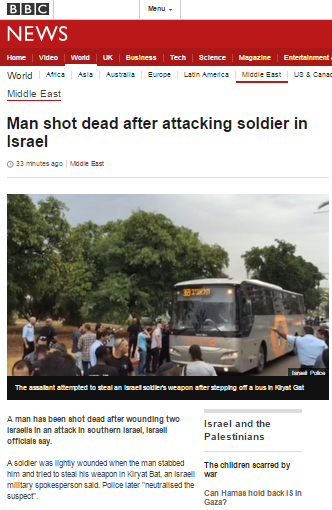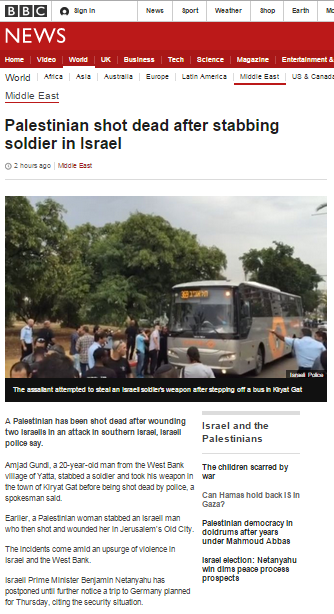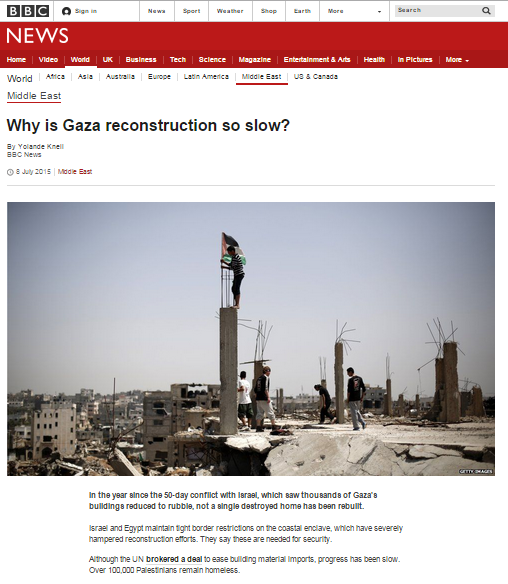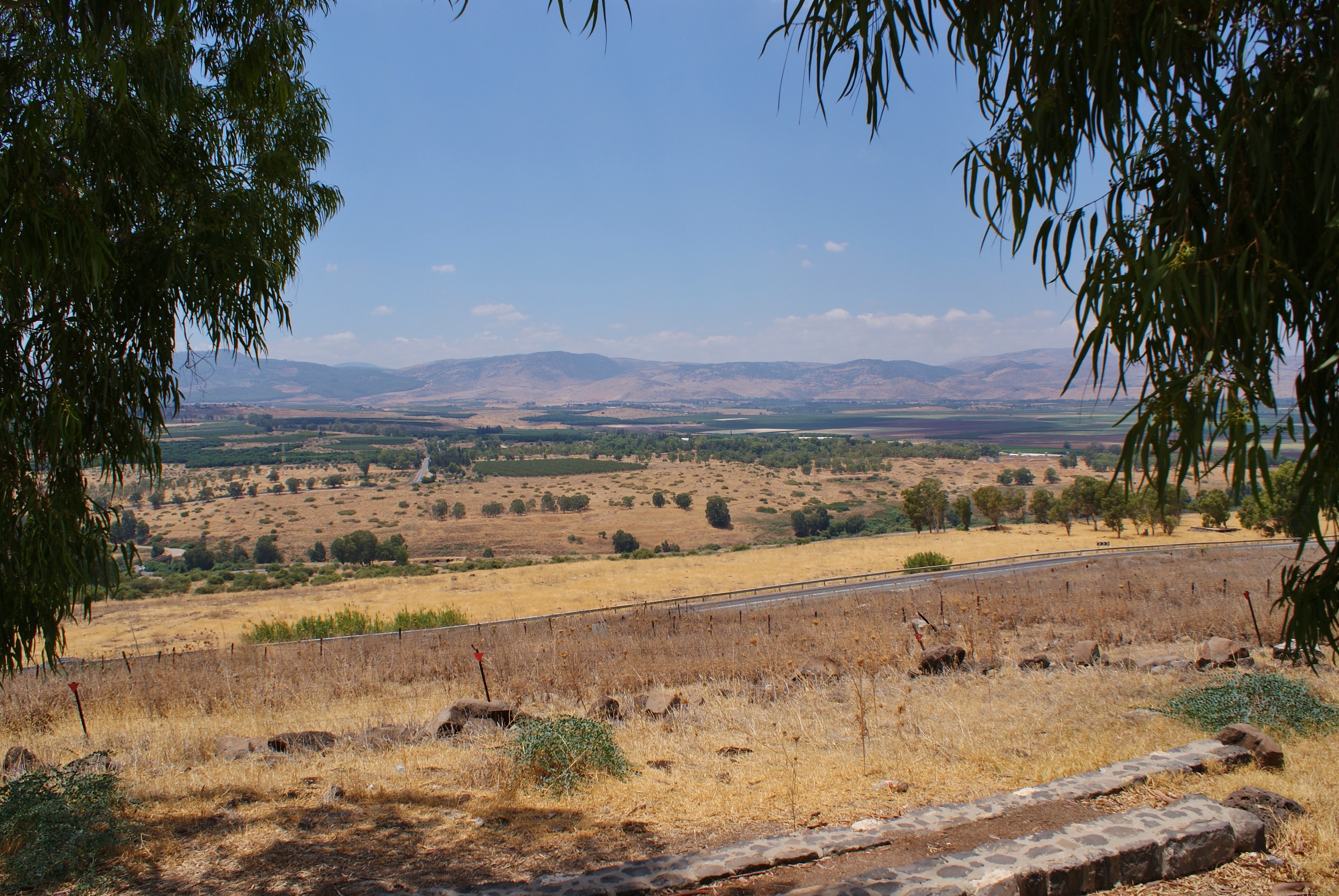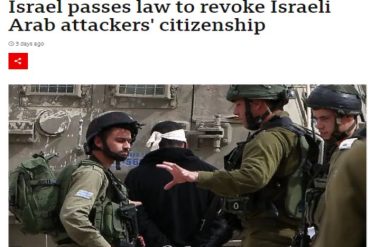October 7th saw a wave of terror attacks across Israel, three of which were reported on the BBC News website in an article which was originally headlined “Two Israelis stabbed in Jerusalem’s Old City” and later retitled “Israeli stabbed in Jerusalem’s Old City” as circumstances became clearer.
The first two versions of the report related to an attack carried out by a Palestinian woman from the Jerusalem neighbourhood of Sur Baher. Both versions included the following statement which presents victims of terrorism and their attackers on an equal footing:
“The stabbing comes amid a surge in violence in Jerusalem and the West Bank that has left eight people dead.”
Readers subsequently discover that those eight people are in fact four Israeli victims of terrorism, two Palestinian terrorists shot whilst in the process of carrying out attacks and two Palestinians shot due to their having been engaged in violent rioting.
“On Monday, Israeli forces shot dead two Palestinian youths during clashes with protesters in the West Bank. Israeli media subsequently quoted military officials as saying one of them, a 13-year-old boy, had been shot by mistake.
Two days earlier, a Palestinian stabbed two Israelis to death in Jerusalem. Another stabbed and wounded an Israeli teenager. Israeli police killed both attackers.
And last Thursday, gunmen shot and killed an Israeli couple as they drove with their four young children in the West Bank.”
The statement concerning the 13 year-old paraphrased by the BBC in these and later versions of the report can be seen here.
Later on in the day another incident took place in the southern town of Kiryat Gat. Once again, the BBC managed to provoke protest on social media with its updated headline to the report.
That headline was later amended but retained its ‘last-first reporting’ style.
Readers of the first three versions of the BBC’s report on that incident were informed that:
“The man [terrorist] then fled into a residential building, where police forces tracked him down and shot him dead…”
Only in version five did readers discover that there was rather more to the story.
“The man [terrorist] then fled into a residential building, where he reportedly forced his way into one woman’s flat, grabbed a kitchen knife and attempted to stab her after realising that the rifle did not have a magazine. Israeli police then arrived at the scene and shot the man dead.”
The later two versions of the report – including the one which currently appears on the BBC News website – were titled “Israelis stabbed in three attacks as tensions escalate” and were updated with reporting on yet another attack which took place in Petah Tikva in the early evening.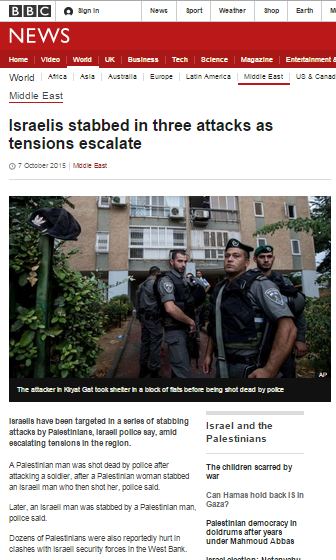
The latest version of the report now opens with the following confusing description which suggests some sort of linkage between the first two attacks:
“Israelis have been targeted in a series of stabbing attacks by Palestinians, Israeli police say, amid escalating tensions in the region.
A Palestinian man was shot dead by police after attacking a soldier, after a Palestinian woman stabbed an Israeli man who then shot her, police said.
Later, an Israeli man was stabbed by a Palestinian man, police said.” [emphasis added]
There are several notable points concerning this evolving article. No attempt was made to clarify to readers that the three specific attacks reported in the various versions of this article were by no means the only attacks to have taken place on that day.
Whilst the reports named the towns of Kiryat Gat and Petah Tikva, no clarification was provided to readers with regard to the fact that the attacks in those places represent an expansion of what was described in the article’s early versions as “a surge in violence in Jerusalem and the West Bank”. In addition, there was no BBC reporting on the protests – some of which turned violent – in towns such as Jaffa and Lod.
Notable too is the fact that the BBC’s reporting adopts and promotes the notion of equivalence between victims of terrorism and their attackers, as well as those engaged in violent rioting, by means of the use of phrasing such as “a surge in violence in Jerusalem and the West Bank that has left eight people dead” and – immediately following a description of Israelis injured in terror attacks:
“Dozens of Palestinians were also reportedly hurt in clashes with Israeli security forces in the West Bank.” [emphasis added]
But the most obvious notable point about this article is that despite all its versions being devoted to reporting on three separate terror attacks in one single day, yet again the word terror did not appear even once in any of them.
The BBC cannot claim to be meeting its public purpose of enhancing the public’s understanding of international issues as long as it continues to avoid clarifying to audiences by means of the use of accurate language that what is happening in Israel at present is a wave of terror.

